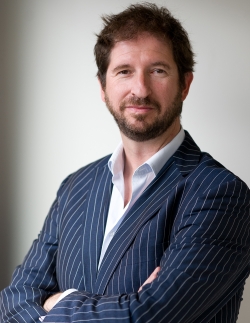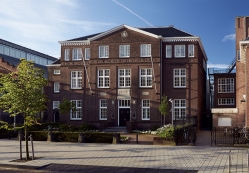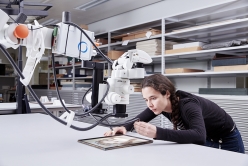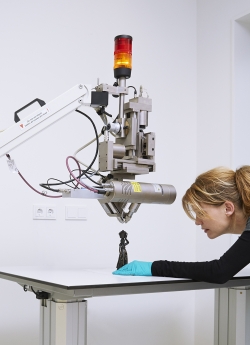Events
Lecture by Dr. Robert van Langh

Dr. Robert van Langh



Photo credit: Rijksmuseum
The Interdisciplinary Ideal:
Netherlands Institute for Conservation+Art+Science+
15 May 2018 (Tue) | 7PM
CPD-3.04, 3/F, Run Run Shaw Tower, Centennial Campus, the University of Hong Kong (Click here for map)
Language: English
Free Admission. Registration required.
Speaker: Dr. Robert van Langh
Head of the Department of Conservation & Science, Rijksmuseum, Amsterdam, the Netherlands
Chair of the Netherlands Institute for Conservation+Art+Science+ (NICAS), Amsterdam, the Netherlands
About the Speaker
Dr. Robert van Langh (1968) has been Head of the Department of Conservation & Scientific Research at the Rijksmuseum in Amsterdam since 2006.
Beginning as a gold- and silversmith, Robert was subsequently trained as a conservator at the National Institute of Fine Arts in Antwerp. After working at the Museum of the Tropics, he became a metals conservator at the Rijksmuseum in 1995. During this time he developed the metals conservation training program now being taught at the University of Amsterdam.
In 2012 he finished his PhD at Delft University of Technology combining Materials Science and Art History with the title: ‘Technical Studies of Renaissance Bronzes'.
As of 2015 Robert is also Chair of NICAS (Netherlands Institute of Conservation, Art and Science), a new innovative multidisciplinary research center housed in the Rijksmuseum Conservation building, uniting art history, conservation and science.
Robert is Chair of the Gordon Research Conference “Scientific Methods in Cultural Heritage Research”, 22 July to 27 July 2018 in Castelldefels, Spain.
About the Lecture
The Netherlands Institute for Conservation+Art+Science+ (NICAS) is a multidisciplinary research institute. The Netherlands Organisation for Scientific Research, the Rijksmuseum, the Cultural Heritage Agency of the Netherlands, the University of Amsterdam and the Delft University of Technology are its founding partners. NICAS brings together the humanities (especially the disciplines of art history, history, and conservation), the natural sciences (chemistry and physics) and data science (computer science and mathematics). It seeks to integrate these disciplines in a lasting framework that is geared towards solving cultural heritage research problems, resulting in a research community that operates across and beyond disciplinary boundaries.
The objective of research within NICAS is to access, understand and preserve cultural heritage objects. The research agenda focuses on three interlinked focus areas: art history (how was the object made and what did it look like?), material dynamics (how did the object change and how will it change?), conservation (what can and should we do about change?). Advanced diagnostics and data science support these focus areas: how can we detect, visualise and model what is taking place in objects? Ideally, research projects bring together as many disciplines as possible, looking at objects and processes from complementary angles.
Research projects will produce fundamental knowledge on hitherto little understood processes of change. However, NICAS also seeks to find practical applications of this knowledge in the heritage field in the form of guidelines and best practices. An important goal is to find the safest ways of presenting the objects to the public and heighten public appreciation for the object as a dynamic material entity, and to optimally preserve cultural heritage objects for future generations by slowing down degradation processes and, when possible and desirable, reversing harmful effects of change over time.
Registration:
For HKU Staff & Students:
https://hkuems1.hku.hk/hkuems/ec_hdetail.aspx?ueid=56390
For Public:
https://hkuems1.hku.hk/hkuems/ec_hdetail.aspx?guest=Y&ueid=56391
Enquiries:
Please contact Ms Angela Chau (ackchau@hku.hk)
Co-organised by:


Generously supported by:
The Andrew W. Mellon Foundation

